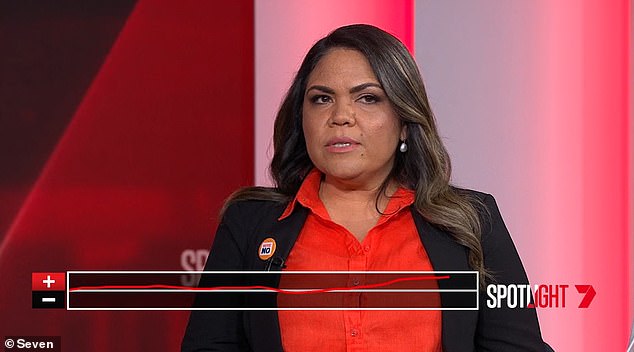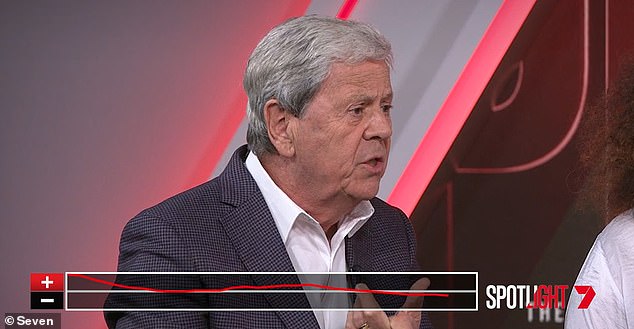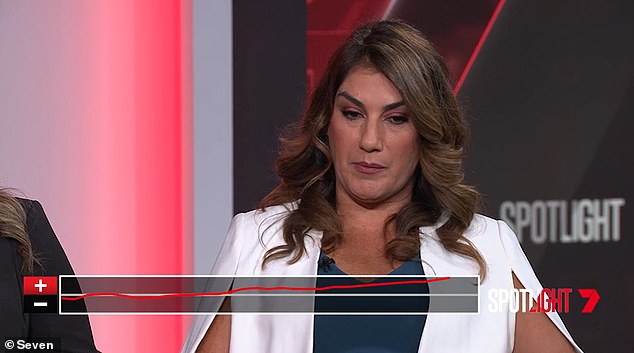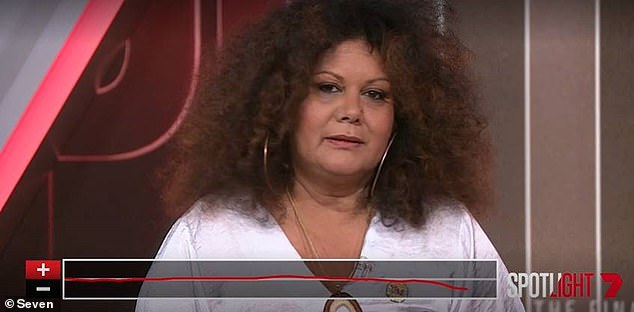Seven’s ‘worm’ shows where Aussies stand on Indigenous Voice after Ray Martin, Jacinta Price, Lidia Thorpe and Malarndirri McCarthy speak
The opinions of ordinary Australians about four of the most prominent figures in the Voice debate were made clear in a TV chart used by Channel Seven.
Seven Spotlight’s Voice to Parliament referendum debate was held on Sunday night and invited Independent Senator Lidia Thorpe, Coalition Senator Jacinta Price, broadcaster Ray Martin and Labor Senator Malarndirri McCarthy to speak.
The segment was accompanied by a ‘worm’ – where undecided voters move a graph up or down depending on whether or not they agree with a speaker.
The worm rose well above the line when Mrs. Price and Mrs. Thorpe spoke, but down when Martin or Mrs. McCarthy had their turn.
All four have Aboriginal heritage, but Ms Price and Ms Thorpe are against an Indigenous voice, while Martin and Ms McCarthy are in favor of one.

Channel Seven’s ‘Worm’ – where undecided voters move a graph up or down depending on whether they agree with a speaker – has made it clear how participants feel about four of the most prominent figures in the Voice referendum debate. Coalition Senator Jacinta Price is pictured

Ray Martin’s worm (pictured) spent most of the show below the line, meaning what he said was unpopular
The worm’s crude and instant measure of popularity showed that the majority of participants opposed the Voice and supported both Mrs Price’s Conservative No cause and Mrs Thorpe’s so-called ‘Not progressive’ views.
The worm went below the line, meaning a negative picture, most of the time when Mrs McCarthy or Martin spoke, especially when the latter tried to defend by calling some No voters ‘d***heads’.
The only setback for Ms Thorpe came when she spoke of wanting a treaty between Australia and Indigenous people.
Presenter Liam Bartlett asked Martin why he ‘chose to abuse people who had a different opinion’ by calling them ‘heads and dinosaurs’ at a Yes rally in the western Sydney suburb of Marrickville.
“I haven’t done that,” Martin replied. ‘That’s part of what I said… I didn’t say No voter was a dinosaur or a head. I said those who vote No because they don’t know… that slogan is one of the stupidest things I’ve ever heard.’
He added that “if someone looks at the issue and decides to vote No, this is completely their democratic right”. I don’t object to that at all.
“If a Yes voter votes without bothering to watch this very important referendum, I think they’re leading too.”
Ms Price defended the slogan “If you don’t know, vote No”, saying it had been impossible for people to find out exactly what they were being asked to vote for.
“When people ask for answers to their questions about how this will all work, how people are chosen, we don’t know, we are told that it will come after the voting is done.
So if you don’t know, if you’re not clear, apparently the government is not clear on how this is supposed to work. That’s a red flag for me, I would vote No,” she said.
Ms Thorpe argued: “It’s not about (indigenous people’s) problems, it’s about the government not letting us decide what’s best for us.”

Although Lidia Thorpe’s worm sometimes went below the line, it mostly stayed very high (photo)

Labor Senator Malarandirri McCarthy (pictured) slipped well below the line at times
Martin said it was the opposite. “The Voice is an opportunity for First Australians to talk about their problems as they haven’t been able to for 235 years (since European settlement),” he said.
Ms McCarthy was responding to indigenous activist Warren Mundine who said the Uluru Declaration from the Heart, on which the referendum question is based, was a “symbolic declaration of war against modern Australia”.
She said his choice of words was ‘most unfortunate. This is actually a peaceful document … we are a very peaceful people.
“This is a peaceful approach through our democratic structure of this country, to demand that our people have a voice included in the Constitution.
“A voice that can provide advice on issues affecting First Nations people.”
In a worrying sign for Prime Minister Anthony Albanese, the worm hit its lowest point of the night when a clip of him speaking to The Voice emerged.
At the end of the show, the majority of undecided voters in the studio chose a side, with 53 percent saying they would vote No, 30 percent saying Yes, and 17 percent still undecided.
Almost 41,000 viewers watching at home also took part, with 72 per cent saying they would vote No, 23 per cent Yes and just five per cent undecided.
(tagsTranslate) daily mail(s) news(s) Indigenous Voice in Parliament(s) Australia(s) Jacinta Award(s) Channel Seven
